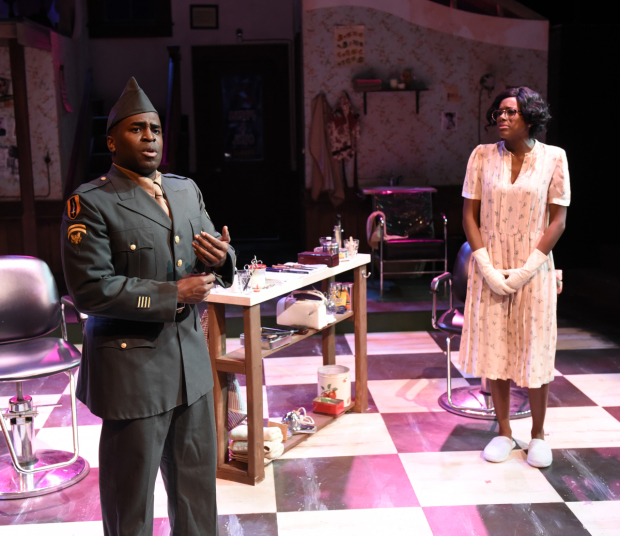Saturday Night/Sunday Morning

(© Glenn Perry)
Playwright Katori Hall burst onto the theater scene in 2010 when she became the first African-American woman in history to win an Olivier Award for Best New Play for The Mountaintop, an imagined account of Martin Luther King Jr.'s last night on earth. Hall's Saturday Night/Sunday Morning was written while she was still studying playwriting at Juilliard, though it didn't receive a full production until last spring when it made its world premiere at Steppenwolf in Chicago. Now enjoying its New England premiere at the Lyric Stage Company with a lively and affecting production by Dawn M. Simmons, Saturday Night/Sunday Morning is a marvelous play that remains first-rate despite its flaws.
It is Memphis, 1945, in the waning days of World War II at Miss Mary's Press and Curl, a beauty shop and boarding house for women run by Miss Mary (Jasmine Rush), a kind but cautious proprietress whose husband was an early casualty of the war. With almost all of the men gone, Miss Mary's is a refuge for young women, some of whose souls could use some fixing. There is plenty of bickering among the girls, particularly between the young, awkward Taffy (a terrific Meagan Dilworth) and her older sister Mabel (Cloteal L. Horne, a revelation), who isn't letting any moss grow under feet her while she waits for her husband to return from the war. The only man left is Buzz (Keith Mascoll), a postman whose bad leg has spared him from the war; the women have so long been deprived of men that even Miss Mary isn't above a little primping in preparation for his daily delivery of mail.
Then there is Leanne (Jade Guerra), the "beauty queen from Texas" who for four years has heard nothing from her boyfriend, Bobby (Omar Robinson), who is overseas "fighting that Hitler man." The girls have grown tired of Leanne's moping and crying, and when a sweet, Bible-clutching, typewriter-toting girl named Gladys (Tasia A. Jones) arrives from Birmingham, they hatch a plan to lift Leanne out of her funk. Gladys, an aspiring writer, agrees to write letters to Leanne as if they were from Bobby. Bonds are formed – and broken – and none of the ladies are prepared for how affected they will be by their men returning – or not returning – from war.
The cast is to die for, with not a weak link to be found. Hall's words come fast and quick, and they roll deliciously and naturally right off their tongues. Dilworth's Taffy is a particular delight, as are Ramona Lisa Alexander and Jackie Davis as Dot and Jackie, weekly customers of Miss Mary's who relish in the daily gossip. One of the play's most chilling moments comes when Jackie reveals that her husband, just home from the war, still encounters brutal racism despite his uniform. Jasmine Rush brilliantly navigates Miss Mary, who is as warm as she is wise, as tough as she is tender. As Gladys, Tasia A. Jones is lovely. It is the performance of Cloteal L. Horne as Mabel, though, that is as searing and accomplished as anything I've seen onstage. The play's final image, in which Mabel sits in silence, her tear-soaked face bathed in Ian W. King's thoughtful lighting, is heart stopping.
Not everything in the play works: A dreamlike conversation between Bobby and Gladys stops the play dead in its tracks. Through playing Cyrano to Leanne's Roxanne, Gladys experiences her own sexual awakening, and while her feelings for Leanne are not a total surprise, the execution of this discovery is one of the play's only improbable moments. Dawn M. Simmons' pristine direction keeps the show afloat through these small sand traps, and her staging is wonderfully fluid. The appropriately drab, well-worn, two-tier set of Mac Young is an ample playing field for these irresistible women.
The title of the play refers to the wee, pre-dawn hours of Sunday morning when the careless sins of Saturday night must be accounted for. Saturday Night/Sunday Morning is a play about a group of people on the precipice, and all of the horrifying, exciting, precarious things that go along with it.
I cannot recall a play in recent memory whose female characters are drawn so richly and finely as they are here. Hall has emerged as a playwright of intense vision, and she is a voice to be reckoned with, in the best possible way. If there is any justice to be found in the American theater, may it come in the form of many, many more stories from Katori Hall.











